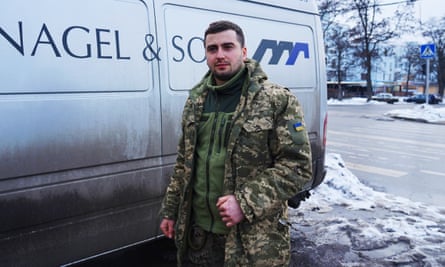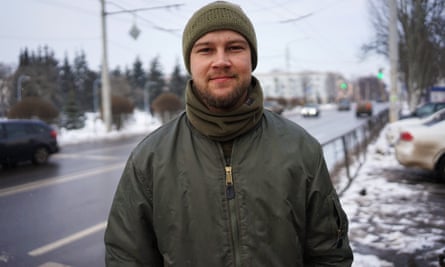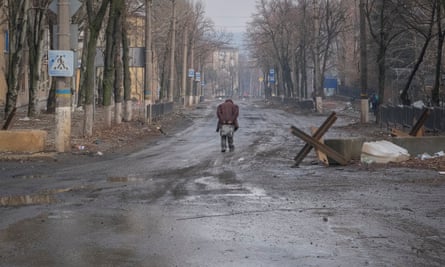'If you don't burrow in you die pretty quickly': the relentless battle for ...
Oleh Bendyk showed off a video taken in Ukraine’s eastern forests. It shows a group of soldiers from Bendyk’s 103rd brigade sheltering in a sandy trench. Around them a battle rages. There are explosions, booms, and the rattle of small arms fire. A grad missile crashes down among the pine trees, in a large orange fireball.
“Some bastards are firing at us from over there. But we can’t see who they are because of the forest,” a soldier says. He adds: “A Grad now! Do you see how we get hit? It’s been like this since 7am. And now it’s 11am. That’s how it fucking is, folks!”
Bendyk and his fellow Ukrainian soldiers have been holding off a surging Russian offensive west of Kreminna, a city that Moscow captured last year. Further along the same front, Ukrainian soldiers are doggedly defending the town of Bakhmut, once home to 70,000 people. Fighting has gone on there for months.

In his latest video address on Monday Volodymyr Zelenskiy acknowledged that the situation was “constantly becoming more difficult”. Bakhmut was “extremely tense”, the commander of Ukrainian ground forces, Col Gen Oleksandr Syrskyi, confirmed. The “most prepared assault units” from the Wagner mercenary group were trying to break through and surround the city, he said.
The Russian army and Wagner have been making incremental gains in the area. In January they took the nearby town of Soledar. So far they have been unable to capture the ruined centre of Bakhmut, despite multiple attempts.
About half of Donetsk oblast in the Donbas region remains under Kyiv’s control, a year after Vladimir Putin’s full-scale invasion. According to Ukrainian intelligence, Russia’s president has ordered his military to seize all of Donetsk and Luhansk provinces by the end of March. A decisive Russian offensive has yet to happen.
“That was an ordinary day,” Bendyk said of the hellish forest video, shot in late January. “Some days are a lot worse, when our guys get injured or killed. The Russians have a lot of artillery. They go quadrant by quadrant. We need more counter-battery fire.”
Other videos filmed by his brigade show soldiers trudging cheerfully through thick snow, trundling along in an armoured personnel carrier, and shrieking in terror when a military helicopter flies low above their car, missing them by a few metres. “Suka Bliad!”, one serviceman screams – “Fucking hell!”
Bendyk also shared with the Guardian footage of an enemy tank captured in the city of Izium during last autumn’s dramatic counter-offensive in the north-east Kharkiv province. There are destroyed vehicles and a clip of a wounded serviceman.
The Russians have mostly encircled Bakhmut from three directions. They can shell the only road in and out of the town, a precarious supply route. It is unclear if Ukraine can hang on or will be forced to withdraw. Last weekend Yevgeny Prigozhin, the Russian oligarch and Wagner’s founder, said his private troops had captured the village of Yahidne, on Bakhmut’s northern outskirts. Ukraine’s military command denies this, but acknowledges Russia is trying to advance, and grinding forward where it can, settlement by settlement.
Map“They have a lot of artillery. We won’t let Bakhmut fall,” Malesh – a 23-year-old Ukrainian soldier said, speaking during a short break from the frontline. He had travelled 25 miles west to the Ukrainian-controlled city of Kramatorsk and was shopping in a supermarket. Street to street fighting was taking place in Bakhmut, he said. “The Russians are 150 metres from us in some places. We don’t see them but we can hear their voices,” he said.
Malesh said his unit was fighting against Wagner troops. “We know this because we took one of their guys prisoner. He was in jail in Russia, got let out to fight in Ukraine, and was then captured by us. He’s behind bars again, ironically enough.” He added: “Wagner are worse than regular soldiers. They are just meat. They keep on coming at us from one direction.”
Most analysts think the Kremlin’s ambition to reach the border of Donetsk province is unlikely to succeed. They cite logistical difficulties and a lack of Russian infantry. Just west of Bakhmut, Ukraine has constructed a formidable defensive system and trench network. It sits in front of an urban agglomeration that includes Kramatorsk and Sloviansk, the latter city briefly seized by Russian groups in summer 2014.
The Ukrainian army had grown expert at digging, Serhii Hnezdilov – a 22-year-old volunteer soldier – explained. He said the Russians would be unable to advance much and described every city in Donetsk oblast as “a mini-fortress”. He emphasised: “If you don’t burrow in you die pretty quickly in war. You start with a small hole. Then you make another one next to it. You keep going.”

In 2019 Hnezdilov put his university studies on hold and joined up. He served on the frontline outside the regional capital of Donetsk, which Russia has effectively controlled for nine years since its annexation of Crimea. He was based in the village of Pisky, close to Donetsk’s ruined airport. For most of last year he fought in Zaporizhzhia province in the south. His company was recently transferred to the east, to boost numbers there.
He described the battle for Bakhmut as relentless and intense: the hottest and most dangerous place on a 600-mile long frontline. “It’s like the first world war … The Russians throw their people in so they can symbolically take the city. It’s terrible. And the place no longer exists.” It had become another Mariupol, the once flourishing city on the Sea of Azov, pulverised last spring by Russian bombs, he said.
Hnezdilov said the Russians were taking huge casualties every day. “It’s a meat grinder. Bodies are left where they fall. Their own people get injured and cry out. Nobody helps them,” he said. Did he feel any compassion for Russian conscripts, some of whom were reluctant to fight and who were clearly demoralised? “No. After what happened in Bucha it’s impossible. They behave like swine and destroy everything,” he replied.

Russia began its invasion last year with long tank columns, sent in from Belarus to storm Kyiv. It latest tactic is to overwhelm the Ukrainians with human waves, sent in without heavy armour, and likened by some to zombies. Hnezdilov said this analogy was inaccurate. “It’s more like a pipe. A pipe of people that doesn’t stop,” he said. By last October about 300,000 Russians had been mobilised and flung into battle. A second round of mobilisation looms, with Russian casualties, according to Kyiv, close to 150,000 men.
Vitaly Ivanov – a sergeant with the 56th brigade – said it would be wrong to dismiss their Russian adversaries as clueless. “Sure, some of them are braindead. But Russia has plenty of professional soldiers too. They have clever people working in military strategy, as well as modern weapons such as Shahed drones. Very often they will send five, seven, or 10 people and order them to go forward. Our job is to destroy them.”
Ivanov said was confident Ukraine could defend Bakhmut. “I think we will hold it. We need to keep it. We don’t want to give them anything.” An engineer by profession, he said he was fighting for his four children, and two grandchildren. “I don’t think the war will finish any time soon. What I can tell you is we are defending our territory and have a very strong spirit.”















































